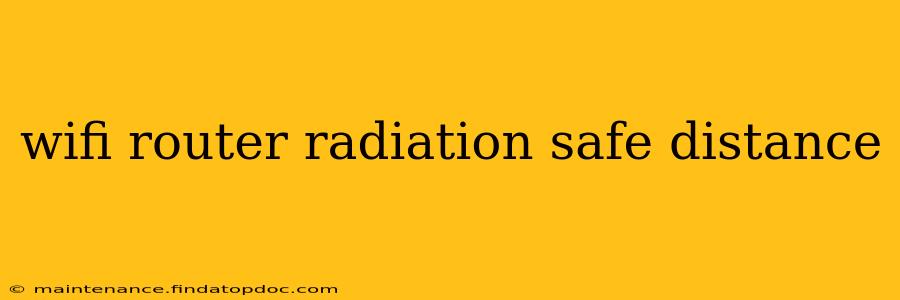Concerns about WiFi router radiation and its potential health effects are common. While the scientific community largely agrees that the levels of radiation emitted by WiFi routers are low and unlikely to cause harm, understanding how to minimize exposure can provide peace of mind. This article explores the science behind WiFi radiation, addresses common questions, and offers practical tips for reducing potential exposure.
What is WiFi Radiation?
WiFi routers use radio frequencies (RF) to transmit data wirelessly. This RF energy is a form of non-ionizing radiation, meaning it doesn't have enough energy to damage DNA and cause cancer like ionizing radiation (e.g., X-rays). The levels of RF radiation emitted by WiFi routers are significantly lower than those from sources like cell phones or microwave ovens. However, it's important to understand the difference between the amount of radiation and the potential effects.
Is There a Specific Safe Distance from a WiFi Router?
There isn't a universally agreed-upon "safe distance" from a WiFi router. Regulatory bodies worldwide set limits on RF exposure, and WiFi routers operate well within these limits. The intensity of the radiation decreases significantly with distance, following an inverse square law (doubling the distance reduces the intensity to one-quarter). Therefore, simply increasing the distance slightly can considerably reduce your exposure. However, the reduction in exposure at typical distances is generally considered negligible from a health perspective based on current scientific understanding.
How Far Away Should I Keep My WiFi Router from My Bed?
This question often arises due to concerns about sleep disruption. While some individuals report sensitivity to electromagnetic fields (EMFs), including those from WiFi routers, scientific evidence supporting a direct causal link between WiFi router proximity and sleep problems remains limited. Keeping your router several feet away from your bed, however, is a reasonable precaution, especially if you're sensitive to EMFs or simply want extra reassurance. The primary benefit of increased distance is a reduction in signal strength, which might improve the reliability of your WiFi connection in some cases.
Can WiFi Router Radiation Harm Children?
Children are often cited as a vulnerable group in discussions about WiFi radiation. However, current scientific consensus indicates that the RF radiation from WiFi routers is not a significant health risk to children. The same safety standards and limits apply to children as to adults. Similar to adults, increasing distance slightly may offer additional reassurance.
What are the Potential Health Effects of WiFi Router Radiation?
Many studies have investigated the potential health effects of long-term exposure to radio frequencies. To date, the overwhelming scientific consensus, including organizations like the World Health Organization (WHO) and the FCC, concludes that the evidence does not support a causal link between WiFi router radiation and adverse health effects at typical exposure levels. However, more research is always ongoing in this field.
How Can I Reduce My Exposure to WiFi Radiation?
Even with the low risks associated with WiFi radiation, some people choose to take additional precautions. Here are some practical steps you can take:
- Increase the distance: As mentioned before, moving your router further away from where you spend the most time can reduce exposure.
- Turn off your router when not in use: This eliminates radiation entirely when not needed.
- Use a wired connection when possible: For devices like computers or smart TVs, using an ethernet cable eliminates the need for a wireless connection.
- Use a shielded cable: This type of cable helps to reduce the transmission of EMF.
Conclusion
While concerns about WiFi router radiation are understandable, it's important to base your decisions on current scientific evidence. The levels of radiation emitted by these devices are generally considered safe by regulatory bodies. However, taking simple precautions like increasing distance and turning off the router when not in use can further reduce exposure and provide peace of mind. Always consult with healthcare professionals if you have specific concerns about EMF sensitivity or health issues related to technology.
